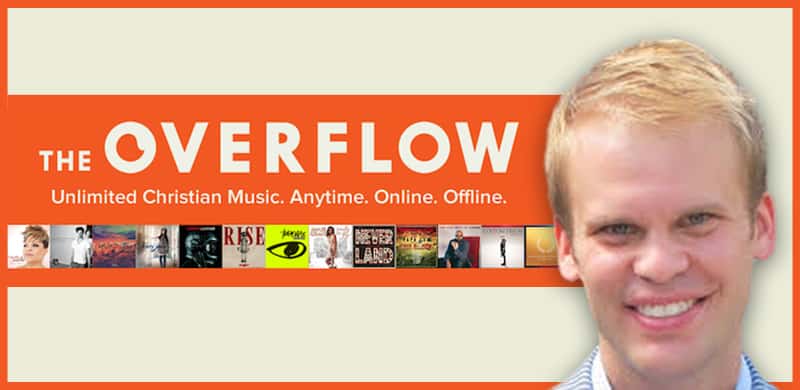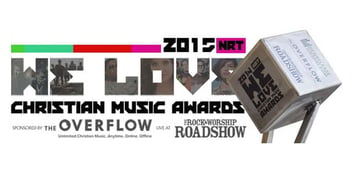INDUSTRY UPDATE: The Overflow CEO Stephen Relph on Why Christian-Specific Streaming Services Are Needed

Stephen Relph
Favorite App:
TheScore sports app
Morning Routine:
(what do you do before you leave for work to prepare for the day):
Morning devotional on the Bible App while the family is asleep. At breakfast I have a morning espresso accompanied by The Economist Espresso App to catch up on global macroeconomic and political issues of the day. From there it’s a quick shift to helping get the kids out the door for school.
Favorite Book/Recommended Book:
Celebration of Discipline: The Path to Spiritual Growth Deluxe Edition by Richard J. Foster
Current Favorite Song/Album:
Favorite song – Your Words by Third Day
Favorite album – Majestic by Kari Jobe
According to Relph, the “walled garden” of a brick and mortar store serves as a strong example of the sort of cross-promotion and recommendations in the streaming space. It’s the inspiration for TheOverflow and the results are strong in the early going. We recently asked Relph about its inception and what hurdles they’re still trying to clear.
What makes a Christian music streaming service a good idea at this time?
I’ll start this with a bit of history. As a Christian music fan, back in the ’90s and early ’00s I exclusively purchased Christian music at my local Christian bookstore. Back then I knew I could trust the bookstore sales associate to make good recommendations for me, and I appreciated the value I received.
For the Christian recording artist, the “walled garden” of a Christian bookstore also limited competition for me in this environment, where I wouldn’t be distracted by or purchase secular competitors. Through effective in-store signage and display activity, the Christian bookstore of the day helped me get the word out for my releases.
Fast forward to the late 2000s, smartphone penetration had skyrocketed and my favorite Christian bookstore had gone out of business. As a consumer I was left with a decision – drive further from home to buy Christian music or buy it online. I chose to buy it online via downloads.
Catching up to today, we see the recorded music industry in a state of flux where, in 2014, on-demand streams grew 54% in the U.S. and Apple purchased Beats at least partially to get into the business. At the same time, we see that Christian and Gospel represented 1.6% of total streams versus over 3% of album purchases. The question that must be then asked is why?
Some would answer that Christians don’t stream, yet, as Greg Bays says, we know that “over half of the Christian/Gospel consumer base is active in the streaming space.”
I believe the answer is that YouTube and mainline subscription services don’t offer a walled garden approach like the classic Christian bookstore, and instead promote the most popular music, not just Christian and Gospel. According to Forbes magazine, mainline services promote “new releases and hits by the world’s most popular artists, most of whom fit into the pop, rock, country, or rap categories. There are plenty of genres that simply don’t win out, unless they are separated and given their own space.”
As a result the Christian music artist’s share of revenues gets depressed across the entire service. If we follow the hypothesis, I believe the long-term impact is that niche music markets like Christian and Gospel will have significantly less quality art developed. We believe that by offering users a better streaming Christian music experience, we can help deliver a better future for the Christian music industry.
I want to ask about the future, but first let me ask this: when you say less quality art is developed, what do you mean? Can you expound on that?
In order to consistently create quality art, artists need flexibility and time to dedicate to their craft. If we go back to the Renaissance, artists often leaned heavily upon wealthy patrons to help provide them the means to focus on their art. In more recent history, artists have been able to earn a living wage through a combination of merch, live performances and recorded music sales. There are lots of questions industry-wide regarding the payout component for recorded music sales in streaming vs. downloads.
Interestingly, there were similar conversations over 10 years ago when Apple launched iTunes. The key difference now is that we’re looking at a share of plays model across the entire ecosystem, not per user, as opposed to a per-person purchase model. As a result, I believe dedicated streaming services for key niches like Christian and Gospel have the potential to improve payouts for Christian and Gospel artists.
To help with the other pieces of the proverbial pie, we plan on introducing merch and ticketing opportunities in the mid-term. Ultimately, The Overflow has a right to exist in so far as great Christian music exists to promote, and we think we can help!
So when you speak of a “better future”, can you provide some tangible points of what you believe that will entail?
To us, the future looks like the ability to leverage technology to create a deeper connection between the music and God’s word, and also stronger ties between the fan and the artist. Christian music has power and meaning and can make you dance or kneel, bring joy or deep comfort, and express the innermost parts of our spirit. We feel called and a sense of deep privilege to help steward the legacy and future of Christian music into literally the hands of Christians throughout the world. It’s not a small or easy task, but the Lord has brought us here, and we’re convinced He’ll carry us collectively through.
What are some tangible things you can bring?
We feel we can help do this with a service that curates to individual user and sub-genre tastes. Each of our genre sections — iOS currently and Android shortly — has featured albums, artists and playlist along with new releases. As the user more quickly finds what they want, they will listen to more music. We’ll be adding more personalization features as well.
In addition, we care about the album as well. Artists spend time creating albums, and done properly as many are, albums tell a story. We want to keep the focus on albums along with playlists to supplement the experience. Albums help build loyalty to the artist — and, of course, individual songs are important too — but full album listening helps drive label and artist payouts.
The Overflow also communicates to fans when a new release comes out both in and out of the app. The amount of social media mentions from competitive services about Christian albums is on average monthly at best. The Overflow’s users want to hear more, and we want to help get the word out. You’ll see some exciting ways we’ll communicate priority new releases within the app down the road.
What about the ticket piece of the pie that you mentioned earlier?
Yes, The Overflow will create merch and ticket sales opportunities for artists. As The Overflow grows, we will be able to help identify markets that are hotspots for artists, and then help intelligently let fans know when their preferred artists are in town.
Earlier you mentioned linking the Bible with the user, but we’ve been focused on the music.
We know from Isaiah 55:11 that God’s word does not return to Him empty but accomplishes the purposes for which it was sent. We’re excited about the unprecedented opportunity to connect God’s people to God’s word electronically via devotionals and commentaries within our service.
What’s the biggest hurdle The Overflow has yet to figure out how to clear?
At the moment pretty much everyone is focused primarily on the U.S. market, and rightly so because of its size. Once you get out of the U.S. though, mainline services de-prioritize Christian & Gospel even more — for example, in Canada, Christian and Gospel gets lumped in as Inspirational and includes music that isn’t Christian.
There are however vibrant Christian music scenes in other Anglophone countries not to mention Brazil and South Korea. Our technology is built multilingual to allow us to scale across borders and languages. God willing, you’ll see us start this expansion within the next 12 months.
##




